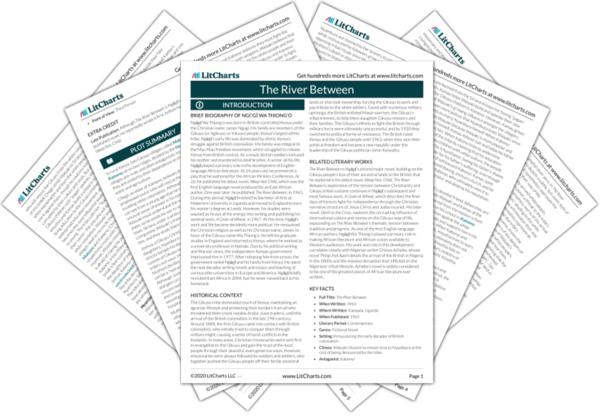Nyambura Quotes in The River Between
“Father and Mother are circumcised. Are they not Christians? Circumcision did not prevent them from being Christians. I too have embraced the white man’s faith. However, I know it is beautiful, oh so beautiful to be initiated into womanhood. You learn the ways of the tribe. Yes, the white man’s God does not quite satisfy me. I want, I need something more.”

Unlock explanations and citation info for this and every other The River Between quote.
Plus so much more...
Get LitCharts A+Nyambura was not circumcised. But this was not a crime. Something passed between them as two human beings, untainted with religion, social conventions, or any tradition.
Day by day [Nyambura] became weary of Joshua’s brand of religion. Was she too becoming a rebel? No. She would not do what her sister had done. She knew […] that she had to have a God who would give her a fullness of life, a God who would still her restless soul; so she clung to Christ because He had died on the Tree, love for all the people blazing out from His sad eyes.
Many teachers came from all over the ridge to see him, and many elders and children came to him with various problems. But in spite of all this Waiyaki was losing that contact with people that can only come through taking part together in a ritual. He was becoming too obsessed with the schools and the widening rift and divisions.
“You must not [marry Nyambura]. Fear the voice of the Kiama. It is the voice of the people. When the breath of that people turns against you, it is the greatest curse you can ever get.”
No! It could never be a religion of love. Never, never. The religion of love was in the heart. The other was Joshua’s own religion, which ran counter to her spirit and violated love. If the faith of Joshua and Livingstone came to separate, why, it was not good. […] She wanted the other. The other that held together, the other that united.

Nyambura Quotes in The River Between
“Father and Mother are circumcised. Are they not Christians? Circumcision did not prevent them from being Christians. I too have embraced the white man’s faith. However, I know it is beautiful, oh so beautiful to be initiated into womanhood. You learn the ways of the tribe. Yes, the white man’s God does not quite satisfy me. I want, I need something more.”

Unlock explanations and citation info for this and every other The River Between quote.
Plus so much more...
Get LitCharts A+Nyambura was not circumcised. But this was not a crime. Something passed between them as two human beings, untainted with religion, social conventions, or any tradition.
Day by day [Nyambura] became weary of Joshua’s brand of religion. Was she too becoming a rebel? No. She would not do what her sister had done. She knew […] that she had to have a God who would give her a fullness of life, a God who would still her restless soul; so she clung to Christ because He had died on the Tree, love for all the people blazing out from His sad eyes.
Many teachers came from all over the ridge to see him, and many elders and children came to him with various problems. But in spite of all this Waiyaki was losing that contact with people that can only come through taking part together in a ritual. He was becoming too obsessed with the schools and the widening rift and divisions.
“You must not [marry Nyambura]. Fear the voice of the Kiama. It is the voice of the people. When the breath of that people turns against you, it is the greatest curse you can ever get.”
No! It could never be a religion of love. Never, never. The religion of love was in the heart. The other was Joshua’s own religion, which ran counter to her spirit and violated love. If the faith of Joshua and Livingstone came to separate, why, it was not good. […] She wanted the other. The other that held together, the other that united.











